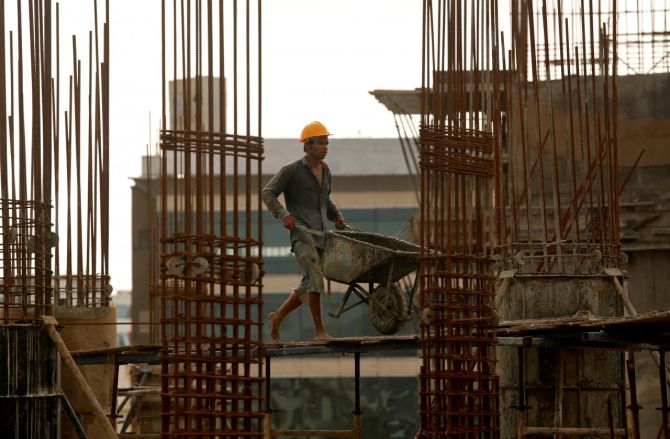Growth in residential prices in most of the top eight cities had been below retail inflation growth and the gap has progressively increased since H1 2016. Average property sizes in top seven cities fell by 17% in the past five years. Millennial homebuyers prefer affordability and good location over larger-sized homes in far-flung suburbs.
Illustration: Uttam Ghosh/Rediff.com

New launches in the residential real estate segment could be cheaper and unit areas, too, could be smaller, keeping ticket sizes low, experts say.
The recent diktat from National Housing Bank (NHB) - asking housing finance firms to desist from offering loans products that involve servicing of the dues by builders on behalf of borrowers - is going to make financing for developers more expensive (interest rates for homebuyers is less than that for developers), and, in turn, have an impact on launches.
Niranjan Hiranandani, chairman and managing director (CMD), Hiranandani Communities, said growth in the residential market would come from affordable housing projects, whose sales are higher.
“Smaller units, and, in turn, smaller ticket sizes is a fast-growing trend.
"Prices of residential realty have not come down much in recent times as the land prices remain high.
"However, new launches can see a reduction in prices,” he said.
If recent deals are anything to go by, land prices continue to remain elevated across the Mumbai Metropolitan Region (MMR).
“As the buyers of these land parcels are larger, organised players who typically command a premium for quality and certainty of execution or delivery, a price correction in MMR may be limited to stuck projects of other developers,” said Adhidev Chattopadhyay, research analyst with ICICI Securities.
Runwal group entered into a deal with Cable Corporation of India to acquire an 8-acre parcel for Rs 530 crore (or around Rs 66.3 crore per acre).
This was more expensive than Oberoi Realty's purchase of 25 acres for Rs 1,200 crore (Rs 48 crore per acre) in the same micro-market in 2015.
“In oversupplied markets such as central Mumbai, which has many under-construction projects with ticket sizes of over Rs 50 lakh, demand continues to remain sluggish.
"Developers are closing deals at the price at which projects were launched 6-7 years ago,” ICICI Securities noted in a recent report.
So, in such projects, developers cannot reduce prices as that may lead to cancellations by those who bought units at the time of launch.
Reputed developers, however, seem divided on price correction.
Kamal Khetan, CMD, Sunteck Realty, said, “Prices have not gone up in the past five years (in MMR), when developers’ borrowing costs have.
"If you add inflation to this, one can say that, in a way, there has been a price correction already.”
Khetan said prices of new launches in the same micro-market (locality) would remain in a similar range.
He said cost of borrowing for builders (who have a strong balance sheet and decent credit rating) is unlikely to go up.
Financing is available to such builders at 9-10 per cent, while some have to borrow at 15-18 per cent, he said.
While reputed developers may be able to hold on to prices, launches, especially by smaller players, are estimated to witness some price correction.
A Mumbai-based analyst, who did not wish to be named, said price correction was likely in new launches.
In existing projects, however, he does not see any price correction happening, as it will then blow the lenders’ cover.
“Earlier, if a developer sought to sell units at a cheaper price than the value of the assets that are mortgaged with the lender, the lender would liquidate his inventory and ask for additional assets to ensure recovery.
"Now, with almost all assets being mortgaged, the developer does not have that option.
"This puts him in a peculiar situation where even if wants to bring down the prices (to ensure faster sales), he cannot.”
ICICI Securties channel checks showed there is already a combined discount of 10-15 per cent on headline prices across the board.
“Developers are also offering 5-10 per cent time-linked discounts even in completed projects, and are prepared to negotiate in case of genuine buyer interest, while not cutting headline prices,” Chattopadhyay said.
Knight Frank’s January to June 2019 report noted there was a sustained price drop in Mumbai, Pune, Chennai, and Kolkata at 3 per cent, 4 per cent, 3 per cent, and 2 per cent, respectively.
“During these years, the growth in residential prices in most of the top eight cities had been below retail inflation growth and the gap has progressively increased since H1 2016,” Knight Frank said.
Prices of apartments in MMR continue to correct.
The weighted average price for MMR was down 3 per cent during H1FY20.
Prices have corrected by 12 per cent from the peak of H22016, Knight Frank noted in its report.
The price reduction is more likely in the affordable category, felt builders.
A recent ICICI Securities report said that between the second quarter of FY18 and the fourth quarter of FY19 around 54 per cent of sales were from units that were priced at less than Rs 50 lakh across eight tier-I cities in India.
Meanwhile, some felt new launches would continue to decline, which would push prices up in a couple of years.
“We expect that supply will significantly reduce over the next 24 months, causing prices to move up meaningfully from 2021,” said a Lodha group spokesperson.
“To ensure faster off take, developers are looking for smaller ticket sizes.
"This essentially means smaller unit sizes.
"This has been happening for a while and the trend is likely to continue,” said the analyst quoted above.
A recent report by Anarock Research said properties in the Rs 40 lakh bracket saw a 23 per cent fall in average sizes (from 750 sq ft in 2014 to 580 sq ft in 2018).
The report showed that average property sizes in top seven cities fell by 17 per cent in the past five years.
Bengaluru saw the least cut at 12 per cent, while MMR topped the table with a 27 per cent average decrease.
“Millennial homebuyers prefer affordability and good location over larger-sized homes in far-flung suburbs,” it said.










